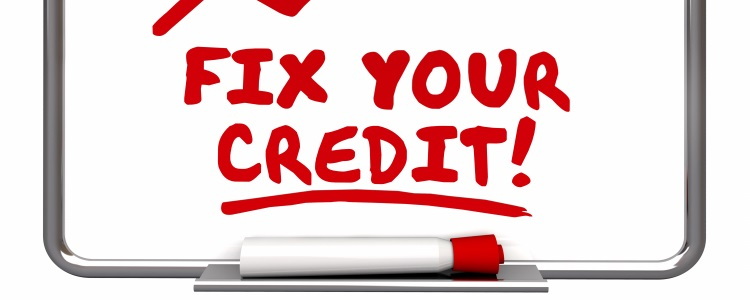There are many steps that can be taken to fix your credit score if it's suffering. But credit isn't one size fits all, so, before you dive into trying anything, be sure you know why your credit looks the way it does. This way, you can take the proper steps to fix your credit score more quickly.
What Makes Up Your Credit?
Your credit score isn't just a random number that someone makes up for you. It's a reflection of the way you handle your finances, and it's always changing. When it comes to buying a car, most lenders look at your auto-enhanced FICO score when they're determining approval.
Your FICO credit score is a three-digit number between 300 and 850 – the higher the number, the better your score. To get that number, your FICO score is broken down into five categories, each one making up a percentage of your total score. The five factors that make up your FICO credit score are:
- Payment History: 35 percent
- Amounts Owed: 30 percent
- Credit History: 15 percent
- New Credit: 10 percent
- Credit Mix: 10 percent
Each of these factors relates to your credit in some way. The two major factors here are payment history and amounts owed, and they have to do with how much credit you're using and how well you do at paying your bills on time.
Your payment history tells the lender how you've paid on all of your accounts for the past seven years. From this, lenders can tell if you're always making payments late, which brings down your score, or if a recent missed payment has stained an otherwise good record. Amounts owed mainly concerns how much of your available credit you're using. It's expressed as a percentage called a credit utilization ratio, and lenders like it to be below 30 percent.
Next comes your credit history. This shows lenders how long you've been using credit. Your credit reports show what types of credit accounts you have open (installment or revolving), how long they've been open, and how recently you used them.
Credit mix and inquiries make up the smallest percentages of your FICO credit score. Credit mix tells how well balanced your credit is between installment credit, such as a car loan, and revolving credit, such as credit cards, while inquiries let a lender know how often you apply for new credit.
Knowing Your Credit Score and Reports
In order to work on the parts of your score that are dragging it down, you need to know what's in your credit reports, and what your credit score is. You can get a free copy of your credit reports once every 12 months from each of the three national credit bureaus: TransUnion, Experian, and Equifax. These can be requested by visiting www.annualcreditreport.com.
You may need to pay a fee to get your scores at the same time, or you can look them up for free from a number of online services (although it won’t be your auto-enhanced score). Also, keep in mind that not all credit bureaus use the FICO scoring model, so your credit score could differ depending on the bureau you get it from.
Tips to Fix Poor Credit
Once you have your credit reports, you can focus on the areas that need improvement. Here are five tips to improve your credit, by factor:
- Improve your payment history: In order to improve your credit score, you should start with the basics by making sure you pay all your bills on time. Because payment history makes up the biggest chunk of your score, this is an easy way to make sure-fire improvements. Focus on the payments that you habitually miss. If it's just not possible to pay on time, talk to the company you owe and see what can be done to make your monthly payment more manageable.
- Get your credit utilization under control: Overspending is a big problem across the US. When you constantly max out credit cards, or only pay the minimum monthly payment, your credit utilization ratio grows. To find out yours, add up everything you owe on your credit cards and divide it by your combined credit limit. The resulting number is your credit utilization ratio. If the number is higher than 30 percent, it could be bringing down your credit score. To improve this, try to pay off your credit card balances in full each month. A good tip is only to charge what you can afford, set aside that amount, and then use it to pay your balance.
- Keep building your credit history: Having no credit history is almost as bad as having poor credit. Once you get your credit utilization under control, don't cancel the cards – using credit helps you keep building it. If you decide to pare down the number of credit cards you have, or to close some lines of credit, you should consider keeping some of your oldest ones, especially if they're working for you like cash back cards or ones you earn air miles on. If they don't require you to carry a balance, consider using them only once a month, and be sure to pay off the balance when the bill comes in.
- Mix it up: It's possible that your credit isn't working to its full potential. In order to build a thin credit file, consider some diversity in the types of credit your carry. If all of your credit is revolving credit, consider taking out a small credit builder loan from your bank or credit union. These installment loans can help you build a credit mix and a positive payment history. On the other hand, if all you have is installment loans such as student loans, consider opening a credit card account.
- Let your credit breathe: If you need to open a new line of credit or finance a big ticket item, do your research first, and only apply when you're ready to go through with it. Applying for too much credit all at once is seen as a red flag to lenders. Additionally, applying willy-nilly just to see if you get approved by anyone offering you a store charge or a "pre-approved" credit card only brings down your credit score. Space out your credit inquiries so your score has a chance to bounce back from the few points it costs each time a lender checks your credit.
Ready to Start Building Your Credit?
If you're ready to improve your credit score and get the vehicle you need, a car loan can be a great tool. Auto financing can add an installment loan to your credit mix, plus each timely payment helps build a positive payment history. But, if you worry a poor credit score is standing in the way of a car loan, you shouldn't run all over town looking for a lender.
Instead, let Auto Credit Express point you in the right direction. We work with a nationwide network of special finance dealers that have the lenders available to help people who are struggling with bad credit, no credit, and even bankruptcy. Don't hesitate any longer! Fill out our online car loan request form, and we'll begin the process of matching you with a local dealership.
















